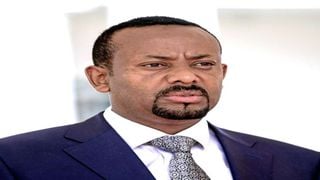
Ethiopian PM Abiy Ahmed.
| File | AFPAfrica
Premium
In Ethiopia, a complex history engulfs the hopes of millions
What you need to know:
- Ahmed, argued one analyst, was the choice of the elite in Ethiopia, in an attempt to pacify Oromo sentiments.
As US Secretary of State Mike Pompeo prepared for the historic trip to Khartoum this week, 20 legislators in Congress wrote him a letter expressing what they called alarm at “security force abuses” in Ethiopia.
“We urge you to engage with the Ethiopian government and all other stakeholders to prevent violence and protect civilians, to promote stability and better dialogue, and to support continued progress towards strengthening democratic institutions,” the Congressmen led by Minnesota's Dean Philips wrote on August 21.
The leaders charged that Ethiopia had experienced “regression in democratic principles” in recent months, citing arrest and detention of activists, politicians and journalists as well as internet shutdowns.
The legislators’ concern was that an unstable Ethiopia would not be a reliable ally for the US in a region faced with security challenges, including a resurgent al-Shabaab in Somalia.
Pompeo’s tour of Khartoum coincided with Prime Minister Abiy Ahmed’s trip to the Sudanese capital, but there was little information on whether the US top diplomat pushed the message to the Ethiopian leader.
Yet the letter itself was somewhat odd about a country whose leader won the Nobel Peace prize in 2019 “for his efforts to achieve peace and international cooperation, and in particular for his decisive initiative to resolve the border conflict with neighbouring Eritrea,” according to the Nobel Committee.
When he came to power in April 2018, replacing Hailemariam Desalegn, he started a series of reforms.
He freed detained political opponents, released jailed journalists and allowed previously banned political movements, including the Oromo Liberation Front, to operate.
A year after the Nobel prize, however, his critics think he has gone back to the country's old tactics of suppression. After the assassination of popular musician Hichalu Hundessa in late June, Ethiopian police said they had detained at least 6,000 people who had resorted to violence to show disgust.
The Prime Minister’s office said some elements supported by external parties had instigated the widespread violence.

President Uhuru Kenyatta and Ethiopian Prime Minister Abiy Ahmed display Ethiopian traditional attire given to them by Gamo elders.
Fought by history
But why? Some critics think Abiy has been fought by a history he didn’t read well.
“Fixing Ethiopia requires strategic foresight, knowledge and appreciation of history. Abiy has none and his Messiah complex doesn’t allow him to take advice,” Awol Allo, an Ethiopian academic at Keele University, argued on his Twitter page.
“Ethiopia faces two key challenges: structural anomalies entangled with the imperial past and a despotic culture.”
Ethiopia, occupying 1.1million square kilometres, has a population of about 110 million, according to World Bank estimates. These belong to different ethnic nationalities, among them the Oromo. Abiy, whose mother was Amhara, became the first PM from the Oromo, the largest ethnic group with about 40 million.
Its history dates back to 600AD. It had a number of emperors until 1974, when the DERG revolution toppled Emperor Haile Selassie, backed by the Soviets.
The Marxist DERG, led by Mengistu Haile Mariam, imposed a stringent rule that resulted in one of the most (in)famous famines in Africa, affecting eight million people and killing one million. In 1991, the Ethiopian People’s Revolutionary Democratic Front (EPRDF), profiting from massive ethnic agitation, toppled Mengistu, at a time the Soviets were weakening.
The Oromo Liberation Front, which had been part of the transitional government, would later, in 1993, withdraw from the government.
Ethiopia was never colonised, unlike its neighbours. But Italian – and sometimes British – influence has contributed to its culture. Yet that history of imperialism, dictatorship and economic woes may have required reforms. But some experts think they could be a problem if one tried to unify the country.
“The lack of shared ideology among the leading ethnic elites, the divergent ethno-nationalistic aspirations of various groups as well as historical grievances and disputes have created a dynamic that has made it difficult for Abiy to push his reform agenda,” Dr Peter Mwencha, the Secretary of the International Relations Society of Kenya, argued.
Abiy Ahmed, argued one analyst, was the choice of the elite in Ethiopia, in an attempt to pacify Oromo sentiments.
“Continued use of force reflects attachment to old regimes, which people resented,” said the official who has worked for the Ethiopian government in the recent past.
“It also means other methods have failed, which could have brought peaceful resolutions to current problems,” he added, referring to reforms as well as debate on federalism.
Dr Abiy collapsed the ruling coalition into the Prosperity Party. Using his ‘Medemer’ mantra, Amharic for ‘Synergy’, he argued the country needed a platform that could push for one agenda. When the country postponed elections due to Covid-19, opponents rejected the idea. Some regions like Tigray have gone on to organise elections, but it is unclear whether they will be held at all.

Ethiopian PM Abiy Ahmed welcomes Eritrean President Isaias Afwerki at the airport in Gondar on November 9, 2018.
Remnants of the past, who are used to running affairs through the elite few, have, however, resisted that push. Is he retreating to break the past from within? Perhaps yes.
Mehari Taddele Maru, a professor at the European University, said Dr Abiy could be struggling to unify the country. He, however, warned it was riskier to return to the old habits of repressing dissent.
“In the absence of constitutive dialogue with the people and given the futility of using force, the weapons of coercion for political authorities boil down to deception, manufactured legalistic confusion and corruption. This will certainly fail,” he tweeted.





